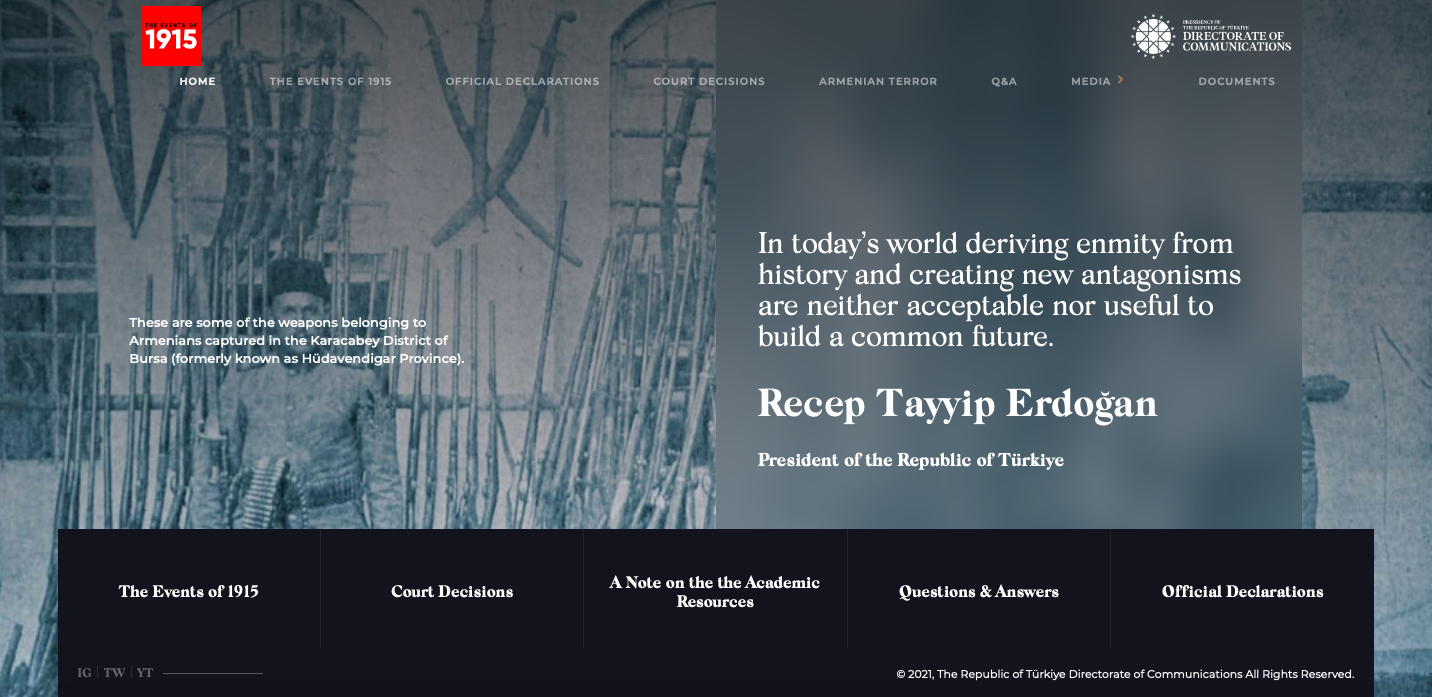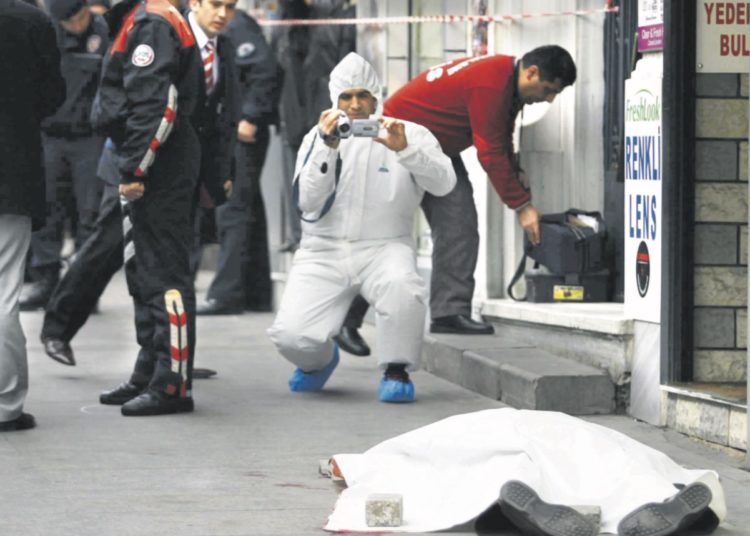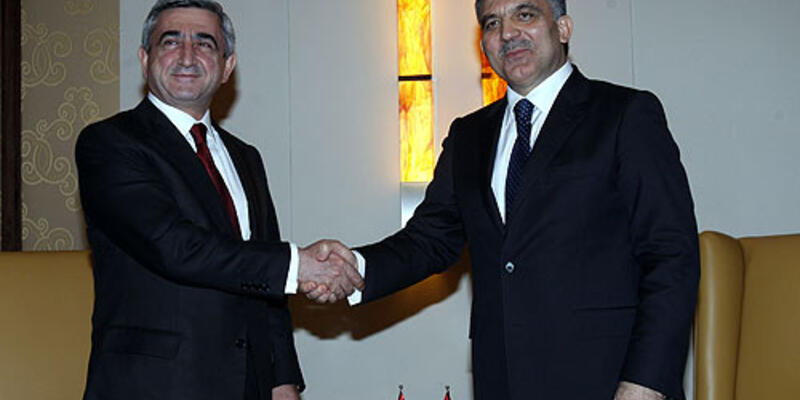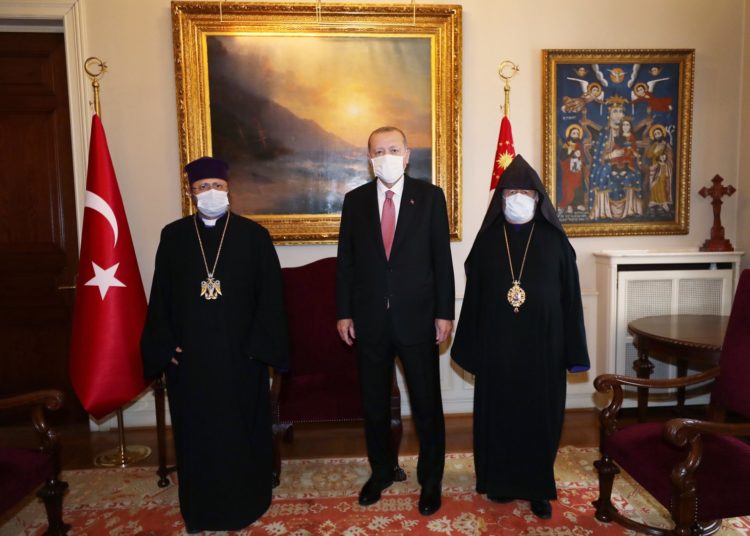Following US President Joe Biden’s formal recognition of the Armenian genocide, which sparked a heated debate in Turkey, the Presidential Communications Directorate announced on April 25 that government website 1915.gov.tr presents all the facts, documents and academic sources regarding the Armenian issue for the benefit of the public. A Nordic Monitor study shows that the two-year-old site is not only insufficient in explaining Turkey’s official narrative but also lacks critical information that was censored and instead focuses on the promotion of Turkish President Recep Tayyip Erdoğan.

So it is not surprising that a message from Erdoğan welcoming visitors says In today’s world deriving enmity from history and creating new antagonisms are neither acceptable nor useful for building a common future. It is a sentence from then-Prime Minister Erdoğan’s official statement of condolence to Armenians in 2014, a gesture that was welcomed by all parties.
Presenting previous work from the Turkish Historical Society and Turkish Foreign Ministry that was apparently collected in a hurry, the website does not offer anything new or original apart from Erdoğan’s commitment to peace and mutual understanding. The site mainly suggests that the inescapable relocation of Armenians during conditions of war caused civilian tragedies but that millions of Muslims also died during World War I and onwards. It also underlines Turkey’s official and long-standing assertion that the Holocaust and the Armenian genocide are historically and legally two different issues that are not comparable.
Firstly, the website attaches much importance to a 2013 European Court of Human Rights ruling regarding the criminal conviction of Doğu Perinçek, President Erdoğan’s neo-nationalist (Ulusalcı) ally, for publicly challenging in Switzerland the occurrence of the Armenian genocide. The court decided that Perinçek’s right to freedom of expression was violated. Despite the court having said it was not called upon to rule on the legal characterization of the Armenian genocide, unlike international criminal courts, and that it had no authority to make legally binding pronouncements, Turkey presented it as an international victory as the top European rights court rejecting the Armenian allegations, which was not the case.
Ironically, the ultranationalist, revolutionist Perinçek, the leader of the Homeland Party who currently supports Erdoğan’s Islamist government, might have been the last person to defend Turkey’s official narrative of the Armenian issue.

Perinçek and his party formally established a political working group called the Talat Pasha Committee, aimed at gaining popularity by raising awareness of sensitive nationalist issues like the Armenian genocide allegations, the Lausanne Treaty and the Turkey-Greece conflict, a move intended to put Erdoğan’s government in an awkward position. The person the committee is named after, Talat Pasha, was the then-minister of interior who ordered the arrest and deportation of Armenian intellectuals in İstanbul on April 24, 1915. He is widely considered the main perpetrator of the genocide, although Perinçek and his inner circle continue to call him a hero.
Additionally Perinçek, who promotes the idea of Turkey, Russia and Iran becoming allied powers along with China against the West, said Joe Biden’s recognition would cause Turkey and Russia to grow closer. Russia formally recognized the Armenian genocide in 1995, a fact very few people in Turkey know.
The website claims the issue of the 1915 events is not taboo in Turkey and that defending diverging narratives is legal in the context of freedom of expression. However, in the ruling of Perinçek v. Switzerland, which is published in its entirety on the website, the court document mentions a significant number of people who suffered for calling the events of World War I in Turkey “genocide.”
For instance, lawyer and politician İbrahim Güçlü said at a press conference in 2001 that for him the events of 1915 and the following years had amounted to genocide and that Turkey needed to come to terms with this and engage in an open debate on the issue. He was then convicted under a legal provision prohibiting propaganda against Turkey’s territorial integrity and sentenced to a year’s imprisonment for the statement.

Hrant Dink, a prominent Turkish-Armenian journalist who was later assassinated in 2007, had been convicted of denigrating “Turkishness” (Türklük), a criminal offense under the Turkish Penal Code. The European Court of Human Rights ruled that Dink’s articles had not been gratuitously offensive or insulting.
In a lesser-known example Jeanne Cox, a lecturer at Istanbul University, was deported from Turkey in 1986 and banned from re-entering the country for saying in front of students and colleagues that “the Turks [had] assimilated Kurds” and “expelled and massacred Armenians.” In 1996 she initiated proceedings seeking to have the re-entry ban lifted but was unsuccessful.
Most recently, following Biden’s announcement, the pro-Kurdish Peoples’ Democratic Party called on Turkey to face its history and recognize the Armenian genocide, sparking strong reactions not only from the ruling party but also other opposition parties. Presidential communications director Fahrettin Altun said, “Your history is the history of the terrorist organization,” an oblique reference to the outlawed Kurdistan Workers’ Party (PKK).

The funny part of the website is that it gives the impression that the history of Turkey’s foreign relations started with Erdoğan. No other Turkish leaders are mentioned. The first attempt at rapprochement between Armenia and Turkey started with the common efforts of then-Armenian President Serzh Sarkisian and then-Turkish President Abdullah Gül, who is now at odds with Erdoğan. Similarly the Zurich Protocols of 2009 were signed by Ahmet Davutoğlu, a former foreign minister and prime minister who was never mentioned. Needless to say, Davutoğlu is currently the leader of an opposition party he established after his expulsion from Erdoğan’s party.
The website is also quite complicated to read and difficult to follow. It is unclear why the photos on the site were chosen, and it is a serious omission that they don’t have any captions in English or Turkish.












